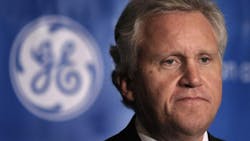General Electric Co. (IW 500/6) asked U.S. regulators to drop its designation as a too-big-to-fail financial institution, one of the central goals of CEO Jeffrey Immelt’s decision a year ago to sell the bulk of the lending business.
Shedding the label would free up billions of dollars in capital and remove restrictive oversight while underscoring a dramatic overhaul of the industrial giant’s operations. Immelt has pulled GE almost entirely away from the banking business built up under former CEO Jack Welch and renewed the company’s focus on making heavy-duty machinery.
GE said it filed an application on March 31 with the Financial Stability Oversight Council to escape classification as a systemically important financial institution. The company has expressed hope that regulators would rule on the request by late this year.
“We believe GE Capital no longer meets the criteria to be designated as a SIFI and we look forward to working cooperatively and constructively with the FSOC through the rescission process,” GE Capital CEO Keith Sherin said.
It should be a “relatively smooth process” for GE to get approval, said Jeff Windau, an analyst at Edward Jones. The government hasn’t said exactly what is required for GE to lose its designation.
“What they’re doing is more aligned with their industrial products. They got out of a lot of the things that would be considered non-industrial or non-core -- real estate, credit cards,” he said. “It bodes well for their chances of getting this accomplished.”
A representative for the U.S. Treasury Department, which handles communications for the financial-stability council, didn’t respond to a request for comment.
Slimming Down
Immelt unveiled a plan last April to shed the majority of GE Capital while retaining only the lending businesses that support the company’s manufacturing operations, including aircraft leasing. GE has reached deals to sell more than $160 billion of finance assets since the overhaul was announced.
Thursday’s application detailed how GE has “substantially reduced its risk profile and is significantly less interconnected to the financial system, and therefore does not pose any conceivable threat to U.S. financial stability,” according to the statement.
GE Capital assets have shrunk 52% since 2012 to $265 billion, while financing receivables, loans to consumers and loans secured by real estate have dropped substantially, the company said. Once the top issuer of U.S. commercial paper, GE Capital reduced its total outstanding by 88 percent to $5 billion. The division said it won’t issue incremental debt for the next four years.
Investor Scorn
GE Capital, which had divisions as varied as retail-store credit cards, commercial real estate and vehicle-fleet financing, has been the target of investor scorn since the business imperiled the parent company during the financial crisis. At the height, lending accounted for about half of GE’s sales and profit.
The GE Capital sale plan was instrumental in drawing the support of Nelson Peltz’s activist investment firm, Trian Fund Management LP, which in October announced a $2.5 billion stake in GE. That purchase helped push GE shares to a 23 percent gain in 2015, far better than the 0.7% decline in the Standard & Poor’s 500 Index. GE rose 0.3% to $31.91 at 12:02 p.m. on March 31 in New York.
GE has said the overhaul could generate $35 billion of dividends for the parent company, pending regulatory approval.
Moving Cash
“The first thing that GE gets to do is they get to start upstreaming all that cash from GE Capital to the parent,” said Deane Dray, an analyst at RBC Capital Markets LLC. “And once the SIFI goes away, they can start putting leverage on the parent balance sheet.”
GE’s announcement came a day after MetLife Inc. won a court ruling removing it from the ranks of systemically important companies. In a lawsuit filed last year, the life-insurer said the designation, used to identify companies whose failures would threaten U.S. financial stability, was arbitrary and unjustified. The government can appeal the ruling. GE decided to work with regulators on an exit strategy rather than go to court.
The Financial Stability Oversight Council, a panel of regulators that identifies systemic risks, named GE Capital as one of four systemically important non-bank financial firms in 2013. The designation tightened regulatory scrutiny of the unit and in coming years will lead to stricter capital-planning and stress-testing requirements.
Executives had targeted the first quarter of this year for GE’s application to remove the classification. The company had been waiting to wrap up a sale of North American commercial lending assets to Wells Fargo & Co., which closed this month.
GE also wanted to make progress on a deal to sell an online deposit platform to Goldman Sachs Group Inc. The Fed said March 21 that it approved the transaction. GE said on March 31 that it expects to complete the sale by April 30.
About the Author
Bloomberg
Licensed content from Bloomberg, copyright 2016.
